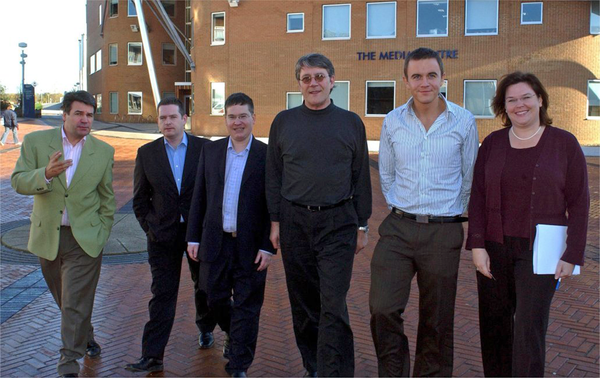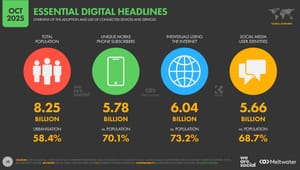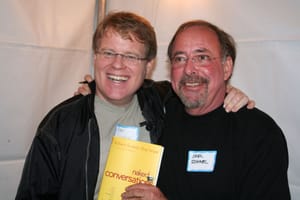Almost twenty years ago, on a crisp November morning in 2005, I joined nearly a hundred communicators at the University of Sunderland in northeast England for something that felt entirely new. The event was called Making the News: Blogging, RSS and the New PR. At the time, the phrase “social media” hadn’t entered everyday vocabulary, but the ideas we were exploring – blogs, wikis, RSS feeds, and the then-emerging world of podcasting – were already reshaping communication.
I wrote about the day just afterwards. Other presenters did, too: Philip, Tom, Stuart (screenshot). [If you know of others who blogged, let me know and I'll add them here.]
What brings it all vividly back to mind is reading a recent interview with Nicky Wake, founder of Don’t Panic Projects, who organised that very event with her late husband, Andy, who tragically died in 2020. Her reflections on 20 years of building Don’t Panic Projects prompted me to revisit my own memories of that milestone day.
It was a remarkable gathering. No one dropped out. People travelled from across the UK – from London, the Midlands, Scotland, and the north-east – and even from Belgium and Latvia. As I said at the time:
"You know this must be something compelling for anyone from London to take a train or drive nearly 300 miles up the M1 for a one-day conference."
That level of commitment spoke volumes about the appetite to understand what these new tools might mean for business communication.
A Full Day of New Ideas
The programme was packed. Tony Bradley, the incoming CIPR president, opened with numbers that underlined PR’s economic weight, before Tom Murphy set the tone with a keynote on how PR must adapt to blogs. Philip Young followed with a lively explanation of blogs’ potential, complete with metaphors about turkeys and tombstones to illustrate the end of “old PR.”
Chris Rushton (not in the photo above) unpacked newsroom research – down to details like why the wrong date format in a press release could doom it. Elizabeth Albrycht made the case for monitoring and evaluation in the new PR, while Stuart Bruce showcased early case studies of blogs in business.
And then came the 3pm slot, listed on the flyer as “speaker to be confirmed.” That turned out to be me. My subject was podcasting for business – still a curiosity at the time, but already sparking experiments, even in the public sector. I could speak with some authority on the topic as I had started the For Immediate Release podcast with Shel Holtz in January 2005 (and we're still going in 2025).
Far from the “graveyard slot,” the room was still full and buzzing with questions. We could easily have carried on the discussion for another hour.
The original event page, along with slide decks used by the presenters, has long since vanished from the web, but I kept a copy of the flyer – a small trip down memory lane.
Looking back, what made this event even more significant was who organised it. This was the very first outing for Don’t Panic Projects. Working with Philip Young and his team at Sunderland, Nicky and Andy Wake took a leap: no budget, only the promise that if they made it work, they could keep the proceeds. They did – and went on to repeat the format across the UK.
For me, this was the start of a long relationship with Don’t Panic Projects (now called Don't Panic Events). Over the years, I spoke at many of their conferences in London, the north of England, and Scotland, and became a judge for their growing portfolio of awards programmes. That involvement continues to this day – this very week, I’ve been judging entries for the 2025 Global Digital Excellence Awards.
Those early days feel very different from today’s communication landscape. In 2005, we were pioneers, genuinely experimenting. The questions asked in Sunderland – “Will credibility suffer if blogs are crafted by PR departments?” and “Will writing for blogs become a special skill?” – sound almost quaint now. Still, they capture the uncertainty and excitement of the moment.
Today, communication is dominated by vast platforms, algorithmic feeds, and increasingly, artificial intelligence. It is noisier, more complex, and often more polarised. But back then, there was a sense of community and discovery – that small groups of people could shape something new.
Interestingly, the same desire for community and discovery hasn’t disappeared. It is evident today in the renewed focus on authenticity, trust, and genuine engagement – whether in niche online communities, professional networks, or new platforms seeking to recreate the intimacy and connection that mainstream social media often lacks.
Remembering the Angels of the North
The conference ended with a panel discussion that could easily have gone on into the evening. Afterwards, as Philip Young guided some of us around Gateshead, we glimpsed the Angel of the North. With its wide-open arms, it seemed a fitting symbol of the welcome and openness of the day – and of the pioneers I met there.
Looking back, Sunderland was more than just another conference. It was a milestone – for Nicky and Andy and Don’t Panic Projects, for me, and for a group of communicators eager to explore uncharted territory. The world has changed dramatically since then, but the energy of that day remains a reminder of what can happen when curiosity, community, and a willingness to experiment come together.
If you were part of those early days of blogging, RSS, and podcasting – or if you have your own memories of Don’t Panic events – I’d love to hear your reflections. What moments stand out for you as milestones in the changing world of communication?




















